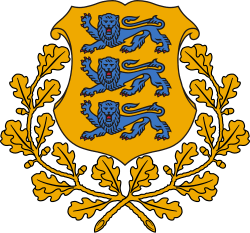Landlords' Party
 |
| This article is part of a series on the politics and government of Estonia |
|
|
Politics portal |
The Landlords' Party (Estonian: Üleriiklik Majaomanike Seltside Liit, lit. National Landlords' Societies Union), also known as the House Owners' Party,[1] was a political party in Estonia.
History
The party was formed prior to the parliamentary elections.[2] In the elections it won two seats in the Riigikogu with 2.2% of the vote.[3][4] The 1926 elections saw the party increase its vote share to 2.4% and retain both seats.[3][5]
Closely aligned with the Farmers' Assemblies party, the Landlords Party joined Jaan Teemant's cabinet in July 1926 and remained in government until December 1927. In the 1929 elections the party won three seats with 2.9% of the vote,[3][5] and in February 1931 they joined Konstantin Päts government.[2]
In February 1932 the party merged into the National Centre Party, which had recently been formed by a merger of the Estonian People's Party, the Christian People's Party and the Estonian Labour Party. The new party won 23 of the 100 seats in the Riigikogu in the elections later in the year.[6]
Ideology
The party represented the interests of private property owners, and advocated classic capitalism.[2]
References
- ↑ Georg von Rauch (1974) Die Geschichte der baltischen Staaten, University of California Press, p146
- ↑ 2.0 2.1 2.2 Vincent E McHale (1983) Political parties of Europe, Greenwood Press, p384 ISBN 0-313-23804-9
- ↑ 3.0 3.1 3.2 Nohlen, D & Stöver, P (2010) Elections in Europe: A data handbook, p586 ISBN 978-3-8329-5609-7
- ↑ Nohlen & Stöver, p582
- ↑ 5.0 5.1 Nohlen & Stöver, p583
- ↑ Nohlen & Stöver, p587
| ||||||||||||||||||||||